Located a stone’s throw from Ossington Station at 945 Bloor Street West in Toronto, the Comedy Bar is seen by many in the community as the home of comedy in the city. Despite there not being any shows going on at 9 a.m. on Thursday Feb. 20, that doesn’t mean work isn’t being done inside. (Will Baldwin/T•)
By Will Baldwin
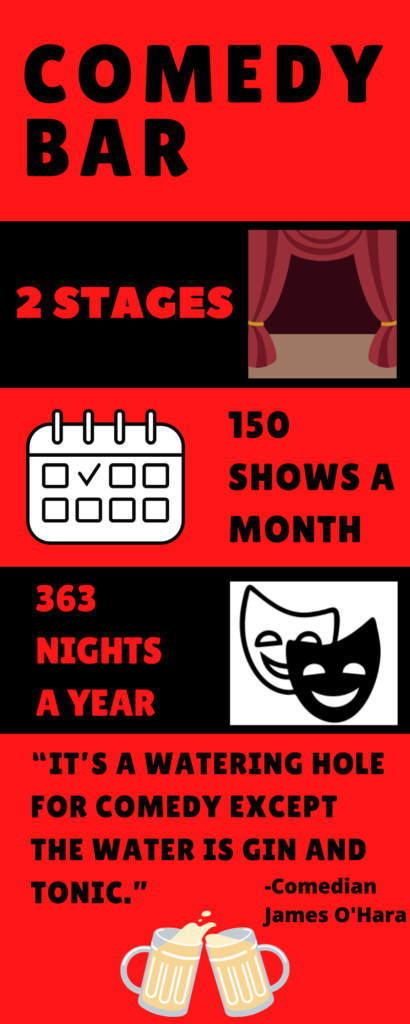
Music bouncing off the walls, a full crowd bantering amongst itself, it’s almost time for Comedy Bar’s first act of Wednesday Feb. 19, “James and Friends.” As the music dips, comedian James O’Hara enters to a loud cheer.
O’Hara’s set to open the show is full of fun, self-deprecating punchlines, best exemplified by how many people feel about his sexuality.
“I’m a bisexual man which means that statistically 20-30 percent of you don’t believe in me,” jokes O’Hara.
Located on Bloor Street right by Ossington Station, Toronto’s Comedy Bar is considered by many to be the home of Toronto’s comedy community. It’s a place built around the idea of giving people a chance, no matter their race, skin colour, sexual orientation, comedic style or anything else that could differentiate performers.
The reason for this goes back to the bar’s origin. Co-founders Gary Rideout Jr and James Elksnitis didn’t want their place to be like the conventional comedy venues in the city that already existed.
“I don’t need the same lineup of three white guys over and over,” says Rideout. “There’s lots of perspectives, it’s great to cultivate everybody.”
The main stage
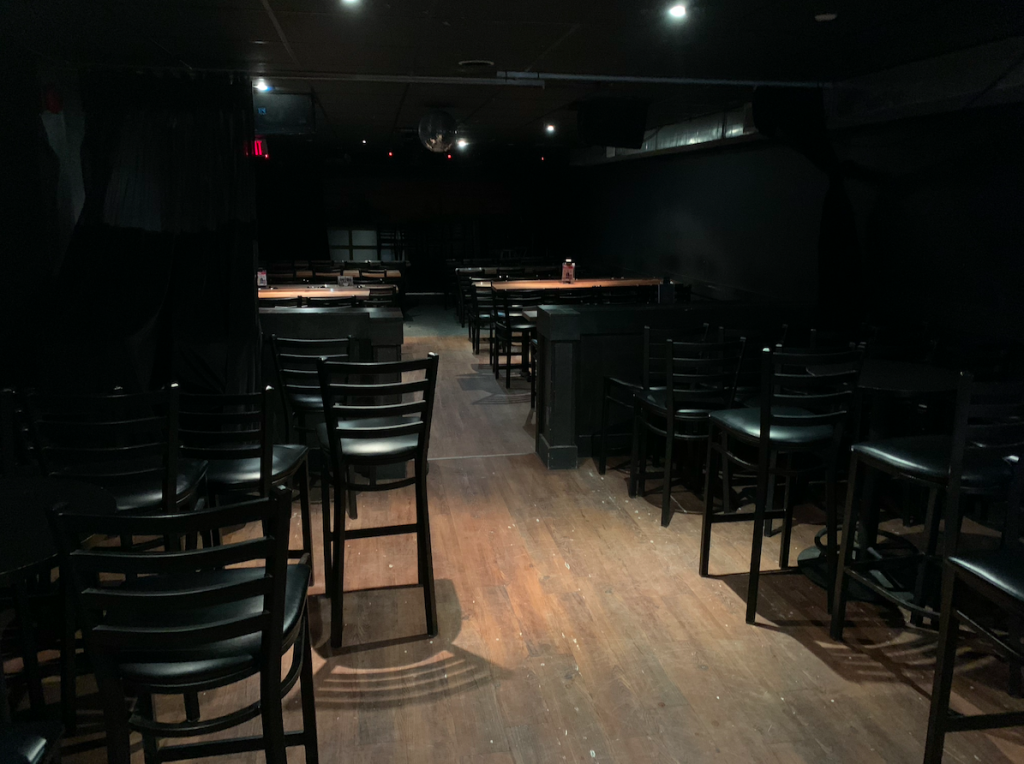
The main stage at the Comedy Bar has played host to some of Toronto’s most exciting shows. Later today on Thursday Feb.20, it will showcase Saturday Night Live’s Anna Drezen.(Will Baldwin/T•)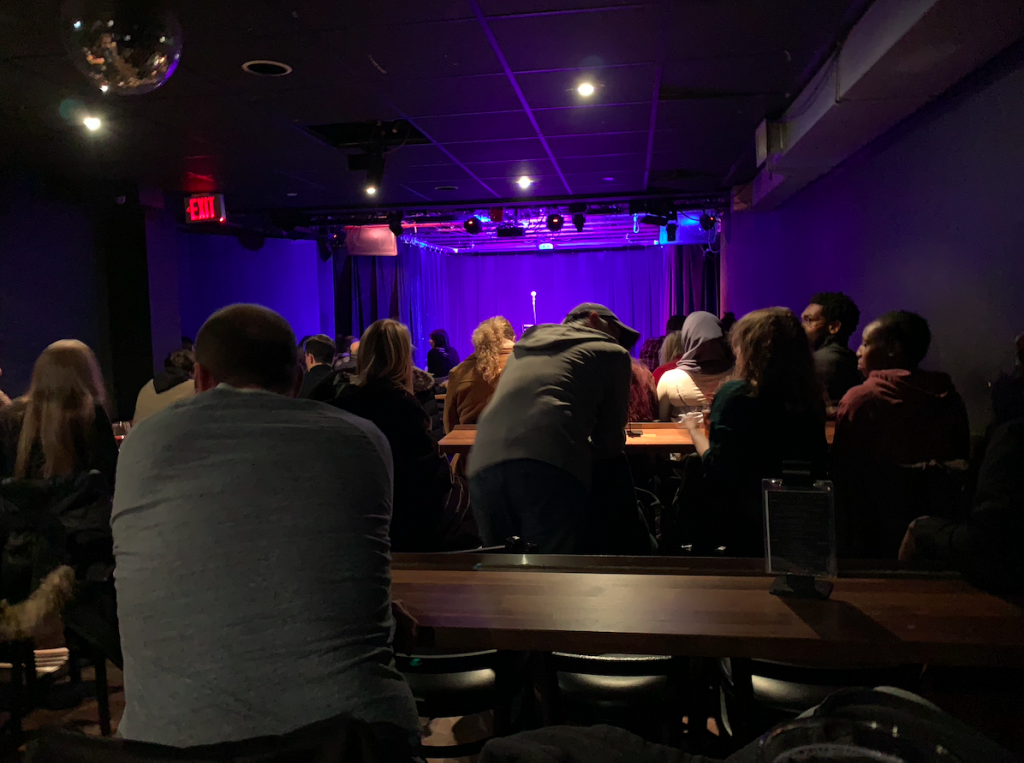
On Wednesday Feb. 19, the main stage at the Comedy Bar once again proved how unique the bar’s lineup can be. The first show was a stand-up comedy show while after it was a drag show. Every night offers something different for Toronto’s comedy community. (Will Baldwin/T•)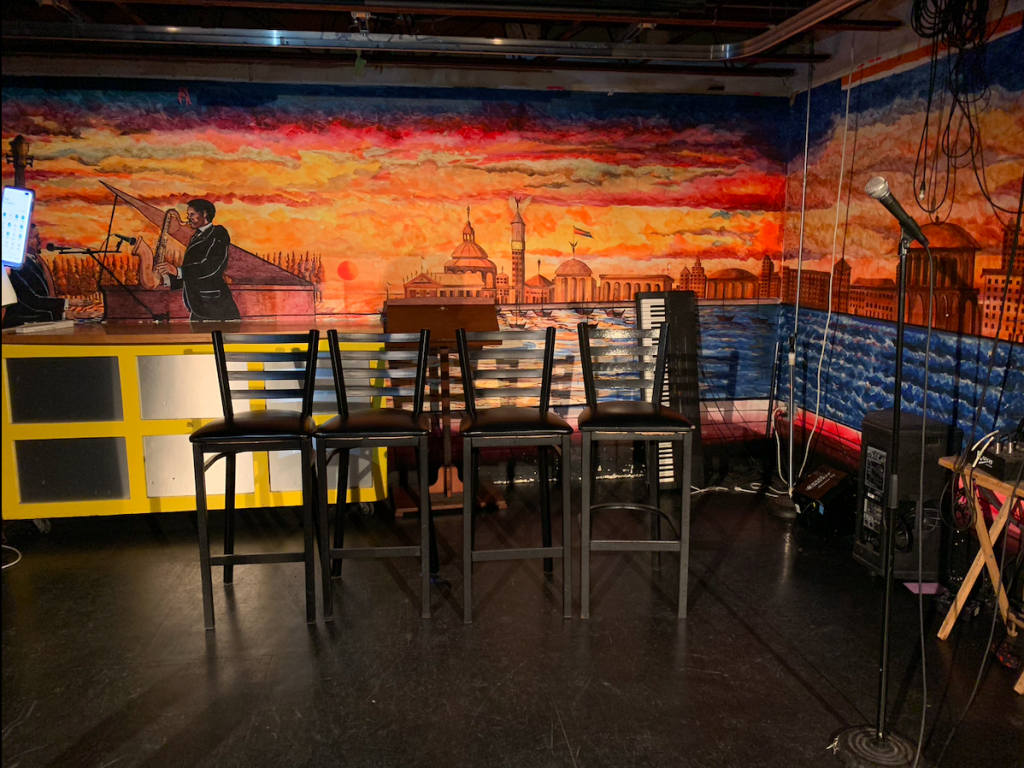
Behind the curtains of the main stage on Thursday Feb. 20, you’ll find the remnants of a mural from the Eritrean restaurant that used to be in the space that is now Toronto’s Comedy Bar. (Will Baldwin/T•)
O’Hara’s show tonight is a great example.
There are Rebecca Reeds and Emily Ferrier making jokes about what it’s like to be a woman in 2020 and Amy Bugg, making fun of her tall and unassuming look that would never lead you to think she’s a comedian. Finally, there are Joe Vu, a self-deprecating Vietnamese Canadian and Jeff White, a teacher whose former students included O’Hara and what seemed like about 85 per cent of the audience.
As the crowd shuffles out the back of the mainstage following the show’s conclusion, murmuring giggles of memories of the best moments of the show, it’s met with the stark realization that this isn’t like any other venue.
Comedy Bar wants to be Toronto’s home for comedy for all. If there’s one issue founders Gary Rideout Jr. and James Elksnitis want to fix to get closer to that goal, it’s the accessibility issues that come with being located down two flights of stairs, seen here on Thursday Feb. 20. (Will Baldwin/T•)
Preparing for the night’s closing show, mingling in and around the bar, were two roughly six-foot tall in-heels, dressed up drag queens. It’s pretty difficult to miss someone with purple hair, dressed in a shiny matching neon purple tank top, wearing a black fur and black feathered skirt.
Up next is the “Real Drag Queens & Kings of Comedy.”
Shows like this didn’t always exist, but thanks to some early innovators as well as Rideout and Elksnitis’ willingness, Comedy Bar became a place for them.
One of those early innovators to Comedy Bar was a feminist show called “Crimson Wave”. The show established early on that there wouldn’t be any rape jokes and that it was a female positive show. Shows like this helped establish a known brand for Comedy Bar.
“It made other people feel comfortable to come forward and be like ‘Hey I have this show called Gender Outlaws or a non-binary show’ and I was like ‘Great we got room for that’,” says Rideout.
Beyond just allowing different shows, it’s obvious once you’re inside that the environment is accepting— thanks to the six pride flags hanging from the ceiling.
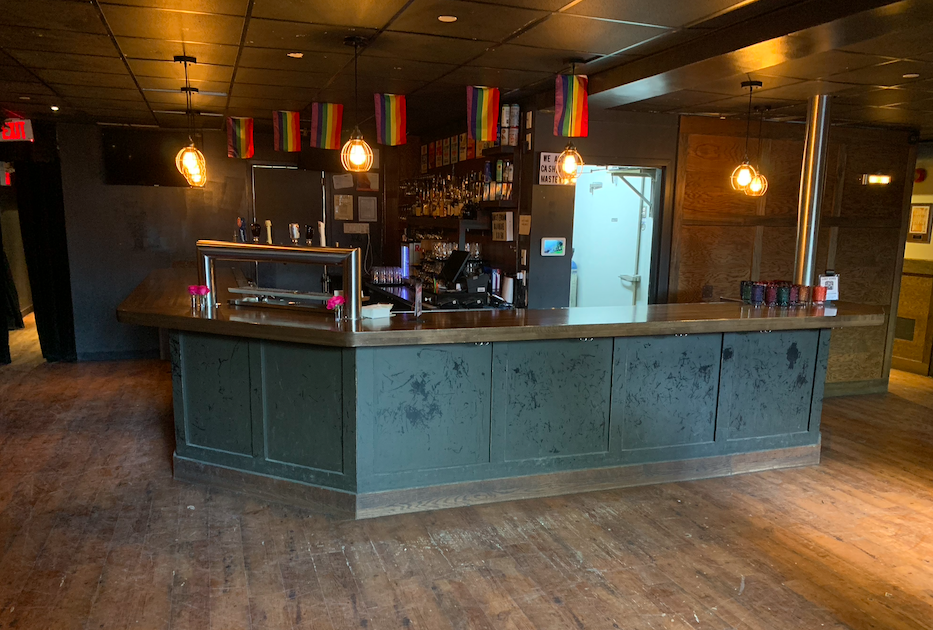
Robert Watson produces a show called “Gay AF” and he points to the impossible to miss flags as something that’s very important to him and his audience. According to him, leaving the flags up allows people to know the space is queer- friendly.
“However people identify, they know they’re welcome there,” says Watson. “They’ve done a good job of searching out diversity.”
Allie Pearse hosts a recurring show called “Slut Parade” and says it’s clear the difference Comedy Bar has made on Toronto’s comedy community.
“It’s obvious his (Rideout’s) values are really positive and he cares about diversity and inclusivity,” says Pearse. “I can’t think of a single person I know in the comedy community in Toronto that doesn’t like that place.”
O’Hara is in full agreement on Comedy Bar’s place in the community. He’s been performing there since he started comedy almost six years ago and to him, the place is a clubhouse for any and all comedians.
“Every time I go there, it feels like a house party,” jokes O’Hara. “It’s a watering hole for comedy except the water is gin and tonic.”
Jen Fitzgerald is Comedy Bar’s general manager and has been around since the beginning. According to her, the feeling of community is present throughout the space.
“When you’re in, you’re part of this bigger thing that’s going on that’s not really easy to describe,” says Fitzgerald. “There’s a really wonderful community and family feel.”
For Rideout and Elksnitis, it’s fun to reminisce about how they got here as from the very beginning, the place itself was unique.
On the south side of Bloor Street, down two flights of stairs, Comedy Bar still somehow pretends to be on street level. This interesting set-up scared Rideout when he first saw it.
“I saw this little for sale sign in the window of this, like, terrifying basement bar and I just clocked it but it was too scary to go in,” says Rideout who was in the area every Wednesday night at the time performing with his sketch comedy group.
A week later, Rideout, with the help of some liquid courage, made the trip down the stairs and discovered something.
“The next week I was drunk, and I was like ‘I’m just going to see what’s down here,’” says Rideout. “When you go down the stairs, there was so much space down there.”
On one of the main walls, the Comedy Bar shows off some of the most famous names to perform there. Tonight for example on Thursday Feb. 20, the Toronto venue will host Saturday Night Live’s Anna Drezen. (Will Baldwin/T•)
When you enter now, the wall to the left is lined with photographs of famous performers from the past, tables are to the right and on the far end is a classic looking bar. Dispersed in the space between the walls and tables are people giving the distinct impression that they all know each other.
An Eritrean restaurant in 2007 when they took over with just a thousand dollars to their names, the space was far from the finished product it is now. The initial plan of a six-week turnaround featuring a quick couple coats of paint turned into a 55-week renovation straight off of HGTV that left the two around $400,000 in debt.
“It was like one of those home reno shows where they pull back one piece of the wall and they have to tear the whole house down,” jokes Elksnitis who’s in charge of more of the business side.
Luckily, the bar found a space in the market and it was soon a success.
Now over a decade later, the success they found came from a uniting factor between all comedians.
“We’re all just trying to get laughs,” says Rideout.




